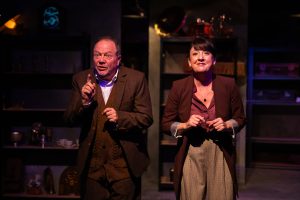
Move over, Anne Frank. Playwright Andrea Stolowitz’s great-grandfather Max Cohnreich has a Holocaust-era diary too.
Written in 1939, as Max is relocating from Germany to New York City, the diary arrives abruptly in the mail to Stolowitz many decades later, by way of the Holocaust archives. Feeling little connection to her ancestors, however, she puts the diary on a shelf, where it sits for eight years.
Eventually curious about its contents, Stolowitz senses its potential to be the subject of her next play. So she applies for a grant to research her ancestry, and off she flies to Berlin to explore her unknown family history.
The result is The Berlin Diaries, a detective story of sorts, now receiving its world premiere at Florida Atlantic University’s Theatre Lab, the first of three such productions under the auspices of the National New Play Network.
Notice that the play’s title is plural, for it refers to both Max’s manuscript and Andrea’s account of her tireless pursuit of her family’s past. Stolowitz places herself at the center of the play, one of some 14 characters, all played by just two actors, the remarkably versatile Avi Hoffman and Niki Fridh. But rather than dividing up the roles, the two play them all, often switching identities one line at a time.
If Andrea’s search for her ancestors is a puzzle, the playwright has mirrored that puzzle in the format of the play. As a result, the production’s style tends to overshadow its substance. What should be an emotional journey becomes more of a cerebral exercise as the audience must continue to work at sorting out who’s who.
In Berlin, Andrea researches the previously unfamiliar relatives mentioned in Max’s diary, reaching back into the past to learn why so many of her clan have disappeared without a trace. All she knew — a much repeated given in her family — was that none of them perished in the Holocaust.
After all, Max had made no reference in his diary to exterminated relatives. That would have been remarkable, and as she eventually learns, many did die in the concentration camps, while others escaped to such far-flung destinations as Israel, Brazil and Australia.
The primary appeal of The Berlin Diaries is the two actors. Fridh and Hoffman change voices, accents and stances as often as they pass caps, spectacles and costume pieces back and forth. They mirror each other with their shared personas, resulting in remarkably symbiotic performances.
The lack of implied action in the play could have resulted in a static production. (And, in fact, an earlier developmental presentation of The Berlin Diaries in Oregon was performed as a radio play.) At Theatre Lab, director Matt Stabile molds the text into discrete site-specific scenes, sending his actors scurrying about Alyiece Moretto Watkins’ storage shelf-lined set. The effect is anything but inert.
Despite her somber subject, Stolowitz finds ways to inject some humor into the brisk, intermissionless evening. Max includes some amusing doggeral in his diary and reveals an obsession with hemmorhoids. And while her character’s sleuthing leads to an awareness of the family members who perished in the Holocaust, she manages to end the play with a ray of hope.
THE BERLIN DIARIES, FAU Theatre Lab, Parliament Hall, FAU Campus, 777 Glades Road, Boca Raton. Through Sun., Dec. 10. $35-$45. 561-297-6124.